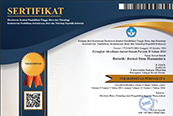Obsessive Neurosis in Those Who Live Between Two Worlds: The Everyday Real World and the Artificial Virtual World of Games
(1) Prodi Sastra Jepang, Fakultas Ilmu Budaya, Universitas Brawijaya, Malang, Jawa Timur
(*) Corresponding Author
Abstract
Games are an ever-interesting cultural phenomenon whose development has been very rapid. Now, there are offline games, online games, arcade games, multiplayer games, etc. Games cater to all ages, and now there are even offline games for toddlers. Meanwhile, there are also more and more genres of online games. Some utilize Virtual Reality, while others even bring virtuality into everyday reality, namely, Augmented Reality. Some of the most popular Augmented Reality games are Ingress, Pokémon Go and Mobbles. Such games, with virtual missions/quests elements in their gameplay, encourage players to go out of the house to adventure in the real world and to meet real people. This study aims to examine the players (subjects) of the Augmented Reality game Mobbles. Mobbles is an Augmented Reality game that was first released in 2012 and was very popular between 2013 and 2016. This is quite a long period of popularity for an online game that was developed DIY by a group of friends from the United States. Of course, as the work of “MSMEs”, in 2016 Mobbles lost its popularity to another game that carried a similar theme but was supported by much greater capital power, namely Pokémon Go. Even so, until 2019, people who are members of Mobbles communities continued to play it, and had even established “friendship communication” with the game’s developers. That is what makes Mobbles particularly interesting. This research uses the theory of subject formation from Lacanian psychoanalysis, especially the concept of the Borromean Knot (RSI). This research examines the activities of a group of players who are members of Mobbles communities, especially from 2014 to 2017. The approach and data search method used is (auto-)ethnography with direct participatory observation. The results obtained from this study are that the gamer subjects are subjects of Obsessive Neurosis. It shall be suggested that from this analysis of Augmented Reality, we can further see and critique the smartphone applications that help us so much that they have become an integral part of our daily lives.
Keywords
Full Text:
PDF (Bahasa Indonesia)DOI: https://doi.org/10.24071/ret.v11i1.6288
Refbacks
- There are currently no refbacks.
Copyright (c) 2023 Yohanes Padmo Adi Nugroho

This work is licensed under a Creative Commons Attribution 4.0 International License.
Retorik: Jurnal Ilmu Humaniora is published by the Graduate Program in Cultural Studies at Sanata Dharma University, Yogyakarta, Indonesia.
Retorik is also available in print edition. Please click here for contact information.










